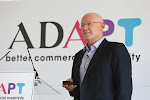"Is it possible to be evidence-based and rigorously scientific in the real world?"
If evidence-based and rigorously scientific means applying scientific method and reporting any limitations to the client, then yes, it is definitely possible. Even in the academic world, one cannot always use that gold standard, the randomised controlled trial. In this case, one simply ensures that readers understand this by clearly noting it as a limitation of the research. Similarly when one encounters limitations in real world research, all we have to do is make our clients' aware that there may be some risks in adopting our recommendations (selection, development, re-org, etc.)
And I believe that limitations reporting is an area perhaps where perhaps real world I-O practitioners could do better. We don't always tell our clients that this psychometric was normed on a population different to yours, that the original results came from a prospective rather than a retrospective investigation, that we can't be 100% sure of the conclusion because correlation is not causation, and so on. And maybe with good reason: because the clients may stopping buying if they knew this!
Bottom line: Evidence-based practice is an ideal seldom achieved in the academic world, and even more difficult to achieve in real world (because conditions are even less controllable). But the role of scientist-practitioners is to implement it to the best of their ability while making sponsors aware of any limitations.
Subscribe to:
Post Comments (Atom)


No comments:
Post a Comment